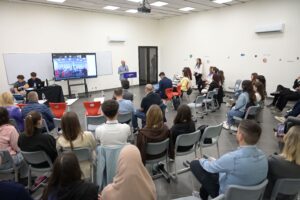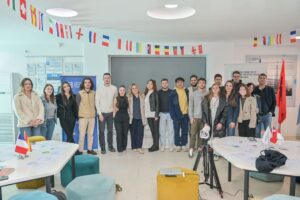Assistant lecturer at UMT, Agresa Qosja has started her doctoral studies in Artificial Intelligence. For the first time, thanks to the cooperation with the Embassy of France in Albania, studies are conducted with zero cost at Tirana Metropolitan University and at Grenoble Alpes University in France.
How did you become part of UMT?
Tirana Metropolitan University is a very welcoming institution. As such, I joined UMT last academic year as an Assistant Lecturer in the Mathematical Analysis and Probability subjects, after a very rigorous and highly competitive selection process. It was a commitment that focused on my professional growth in teaching and scientific research.
How was the process of realizing you PhD. dream at UMT?
The university that I already joined is the only one that offers the third cycle of studies in Artificial Intelligence in Albania, for this reason I immediately applied to this program. I entrusted my studies to the Metropolitan University because, in addition to the practical and theoretical dimension, it provides total financial support for doctorates. Also, the internationalization of UMT has made it possible to conduct studies partly in Albania and partly in European and American universities. I am fortunate to continue my studies between UMT and Grenoble Alpes University in France, which is part of the list of 150 best universities worldwide.
How is the study expected to continue in the coming years? How is the leadership of this doctorate organized?
The study in the coming years is expected to be 6 months in Tirana and 6 months in Grenoble for each year. The subject leaders are esteemed professors at both universities. In UMT the leader is Prof. Assoc. Dr. Ligor Nikolla, at the same time Dean of the Faculty of Computer Science and IT, also Prof.Assoc.Dr. Eralda Gjika, lecturer at UT, Faculty of Natural Sciences. Leaders from the French side are Prof. Dr. Didier Georges and Prof.Dr. Arben Çela, respectively part of UGA and UGE (Gustav Eiffel University).
Will your commitment to UMT continue during the doctoral studies?
Of course, I will continue to be part of UMT in the position of Assistant Lecturer with a much reduced rate of teaching hours and a focus on scientific research, as this is a condition and at the same time a favor for continuing doctoral studies at UMT but also the best way to do my research. The engagement at UMT, in addition to the payment as an Assistant Lecturer, also enables me to have zero costs for my doctoral studies. Likewise, for studies in France, the coverage of expenses has been made possible by a scholarship granted by the French Embassy in Tirana.
An important part is the cooperation with colleagues and study facilities. What are the conditions in your case?
Colleagues at UMT are very cooperative and ready to offer help in any case. Noteworthy to emphasize is the cooperation with other doctoral students at UMT. The fact that unites us more is the study of Artificial Intelligence and Intelligent Systems and in these conditions we exchange ideas, share discussions together, materials and of course motivate ourselves for the work we are developing. Regarding the study environment at UMT, a fantastic environment has been created in the Artificial Intelligence Laboratory where doctoral students work and discuss their ideas with leading Albanian and foreign professors, as it must be said that the Metropolitan University has a wide network of international collaborators who are lecturers, researchers, very good experts in their fields and have an already consolidated connection with the university.
What are the topics on which the UMT doctorates are focused? How useful are such studies to Albania?
Doctorate topics are very interesting topics also regarding the problems we have in the country. Specifically, my doctoral topic focuses on electricity, its production and distribution, while other topics that are being researched by colleagues are related to interests such as the study of cancerous diseases, mainly breast cancer, the evaluation of new methods in diagnosis and treatment its early especially in young patients. But cyber security, security systems, solving the problem of transport and traffic in the country are also in their focus. Such studies are useful to Albania in two ways: firstly, all topics are more nationally important, even among the topics that today have a wide public interest, and secondly, the way they are being carried out will set another standard for scientific research in the country.
What does Agresa expect at the end of this study cycle?
At the end of the study cycle, I expect that the results of my work will be useful to everyone, but also that this practice will be an important cornerstone in the creation of a sustainable ecosystem of artificial intelligence and intelligent systems in Albania.




